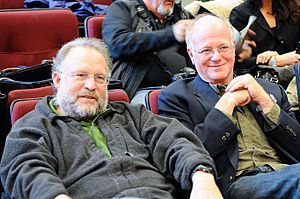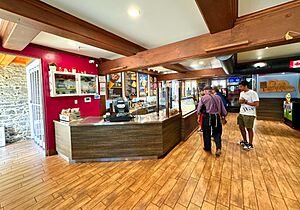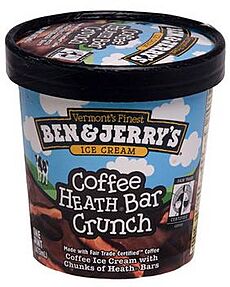- This page was last modified on 17 October 2025, at 10:18. Suggest an edit.
Ben & Jerry's facts for kids
"B&J" redirects here. For the beverage company, see Bartles & Jaymes. For the music retailer, see Buegeleisen and Jacobson.
 |
|
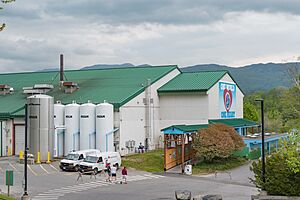
Factory in Waterbury, Vermont
|
|
|
Trade name
|
Ben & Jerry's |
|---|---|
| Subsidiary | |
| Industry | Food processing Franchising |
| Founded | May 5, 1978 in Burlington, Vermont, U.S. |
| Founders |
|
| Headquarters |
,
United States
|
|
Number of locations
|
558 (2019) |
|
Area served
|
Worldwide |
| Products | Ice cream |
| Parent | Unilever |
Ben & Jerry's is a well-known American company that makes delicious ice cream, frozen yogurt, and sorbet. It started in 1978 in Burlington, Vermont, as a small ice cream shop. Over the years, it grew into a huge brand known around the world. In 2000, a big company called Unilever bought Ben & Jerry's. However, Ben & Jerry's still runs mostly on its own. Its main office is in South Burlington, Vermont, and its factory is in Waterbury, Vermont.
Ben & Jerry's is famous for its creative flavors. Many of these flavors mix in yummy foods and desserts with the ice cream. Some flavors have even been named after famous people like musicians or comedians. The company and its two founders are also known for caring about important social issues. They show this through how they make and sell their products.
Contents
History of Ben & Jerry's
How Ben & Jerry's Started
The company was started by Ben Cohen and Jerry Greenfield. They had been friends since they were kids in Merrick, New York. In 1977, Ben and Jerry took a class on how to make ice cream. Ben Cohen has a condition where he can't smell very well. Because of this, he focused on how food felt in his mouth. This is why Ben & Jerry's ice cream often has big chunks mixed in!
On May 5, 1978, Ben and Jerry opened their first ice cream shop. It was in an old gas station in Burlington, Vermont. They invested about $12,000 to start their business. In 1979, they celebrated their first anniversary by holding the first "Free Cone Day." This is now a yearly event where everyone can get a free scoop of ice cream.
In 1980, Ben and Jerry started putting their ice cream into pint containers. The first Ben & Jerry's franchise, which is like a branch store, opened in 1981 in Shelburne, Vermont. In 1983, Ben & Jerry's ice cream was used to build the "world's largest ice cream sundae" in St. Albans, Vermont. It weighed over 27,000 pounds! That same year, the cows on their ice cream cartons got a new look from a local artist.
Ben & Jerry's faced challenges from other big ice cream companies in the 1980s. They even had to go to court to protect their right to sell their ice cream widely.
In 1985, the Ben & Jerry's Foundation was created. This foundation uses some of the company's profits to help community projects. In 1986, they launched the "Cowmobile." This was a special vehicle that Ben and Jerry drove across the country to give out free ice cream. It was a fun way to share their brand!
In 1987, they created "Cherry Garcia," a flavor named after musician Jerry Garcia. It quickly became one of their most famous flavors.
The Ben & Jerry's factory in Waterbury, Vermont, opened in 1985. It started offering public tours in 1986 and still does today. This factory makes over 350,000 pints of ice cream every day!

Ben & Jerry's display freezer at a Domino's store
In 1988, Ben Cohen and Jerry Greenfield were named U.S. Small Business Persons of the Year by President Ronald Reagan. That same year, they started using brownies from Greyston Bakery in their popular Chocolate Fudge Brownie flavor. In 1992, Ben & Jerry's worked with the Children's Defense Fund. They wanted to make sure kids' basic needs were a top priority for the country.
In 1989, Ben & Jerry's announced they were against using a genetically engineered hormone called rBGH in their products. They prefer to use ingredients that are less chemically processed.
The Unilever Era
Company Sale to Unilever
In April 2000, Ben & Jerry's was sold to Unilever, a large British food company, for $326 million. As part of the deal, Unilever agreed to let Ben & Jerry's continue its work on important social and economic issues. Both founders stayed involved with the company after the sale.
By 2019, Ben & Jerry's had factories in Vermont, the Netherlands, and Israel. In 2022, the Israeli factory was sold to a local partner.
In 2023, Dave Stever became the new CEO. However, in March 2025, the company stated in a court filing that Unilever had removed Stever as CEO. Ben & Jerry's claimed this was because of the company's social and political activism.
Changes in Packaging
In 2001, Ben & Jerry's started using "Eco-Pint" packaging in the U.S. These were environmentally friendly containers made from unbleached paperboard. However, they stopped using them in 2006 because of challenges with getting enough of the material. They switched back to a bleached paperboard container that was easier to find.
Speaking Out on Issues
On Earth Day in 2005, Ben & Jerry's protested a plan to drill for oil in the Arctic National Wildlife Refuge. They made a giant Baked Alaska weighing 900 pounds and placed it in front of the U.S. Capitol Building.
In 2009, Ben & Jerry's played an April Fool's Day joke. They created a fake company called "CyClone Dairy" to raise awareness about products from cloned animals. They wanted people to know where their food comes from.
In 2013, Ben & Jerry's decided to make their products GMO-free. They also supported laws that would require food labels to show if products contained GMOs.
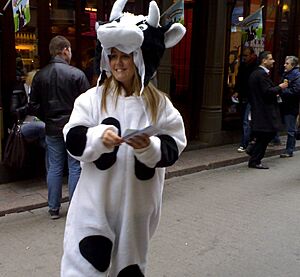
Woman in cow costume promoting Free Cone Day outside a Ben & Jerry's shop in Stockholm, Sweden
Sales in Israel and Palestinian Territories
In July 2021, Ben & Jerry's announced they would stop selling ice cream in the Occupied Palestinian Territory. This area includes Israeli settlements, which are considered illegal under international law. The local Ben & Jerry's partner in Israel did not agree with this policy. So, in June 2022, Unilever sold its Ben & Jerry's business in Israel to that local partner. Ben & Jerry's disagreed with this sale, saying it went against their values.
Free Cones
Every year, Ben & Jerry's gives away over a million free ice cream cones on "Free Cone Day." This event often helps charities raise money. Sometimes, local celebrities join in, and volunteers help people register to vote. Due to the COVID-19 pandemic, Free Cone Day was paused from 2020 to 2023.
Reducing Farm Emissions
In May 2022, the company started a project called 'Mootopia'. They worked with 15 farms to try and cut down on farm emissions by half by the end of 2024. The farms are learning new ways to grow crops for animal feed.
Child Labor Concerns
In early 2023, a newspaper reported that some suppliers for Ben & Jerry's were employing migrant children. Ben & Jerry's said they prefer children to have jobs in safe, monitored places if they need to work full-time.
"Progress Comes in Many Flavors" Campaign
In July 2024, Ben & Jerry's launched an ad campaign called "Progress Comes in Many Flavors." These ads encouraged people to take action on important social issues.
Unilever Spin-off and Independence Concerns
On March 19, 2024, Unilever announced it would sell off its ice cream brands, including Ben & Jerry's. This is expected to be completed by the end of 2025.
In 2025, Ben & Jerry's independent board accused Unilever of not respecting their agreement. The board claimed Unilever stopped them from posting on social media about supporting Palestinian refugees, student protests, and a ceasefire in the Gaza war. They also said Unilever blocked donations to certain groups and fired CEO David Stever because of the company's political views.
Popular Flavors and Treats
For many years, "Cherry Garcia" was the most popular Ben & Jerry's flavor. But in 2013, a survey found that "Cookie Dough" was the favorite. As of late 2020, the company's website says "Half Baked" is the most popular, followed by "Cherry Garcia" and "Chocolate Fudge Brownie."
The "Vermonster" is a huge ice cream sundae served in Ben & Jerry's shops. It has 20 scoops of ice cream, four bananas, lots of hot fudge, cookies, a brownie, walnuts, and whipped cream. It's a massive treat! Ben & Jerry's also holds a "Vermonster Challenge" each year. Teams try to finish a Vermonster to win free ice cream for a year.
"Chubby Hubby" is a flavor with vanilla malt ice cream, fudge, peanut butter, and pretzel pieces. In September 2009, Ben & Jerry's renamed it "Hubby Hubby" to celebrate when same-sex marriage became legal in Vermont. The carton even showed two men getting married under a rainbow.
In March 2012, Ben & Jerry's changed the name of a flavor in the UK to support equal marriage rights. "Oh! My! Apple Pie!" became "Apple-y Ever After."
"Chocolate Chip Cookie Dough" was temporarily renamed "I Dough, I Dough" in the U.S. in 2015. This celebrated the U.S. Supreme Court's decision to support same-sex marriage. Money from sales went to a group that supports LGBT rights.
Ben Cohen and Jerry Greenfield have appeared on TV shows to introduce new flavors. They created "Stephen Colbert's AmeriCone Dream" with comedian Stephen Colbert. They also made "Late Night Snack" and "The Tonight Dough" with Jimmy Fallon.
Ben & Jerry's also offers vegan ice cream options. They started with four vegan flavors in 2016, including "Chunky Monkey" and "Chocolate Fudge Brownie" in non-dairy versions. They have continued to add more vegan choices over the years.
In October 2018, Ben & Jerry's launched a limited-edition flavor called "Pecan Resist." This flavor had a political message about standing up against certain government actions. The company donated money to groups that support women's rights, immigrant rights, climate justice, and racial justice.
Social and Political Stances
Product Labeling
A consumer group once asked Ben & Jerry's to stop calling their ice cream "all natural." This was because they used ingredients like corn syrup and processed cocoa. In 2010, the company agreed to stop using the "all natural" label.
In 2011, Ben & Jerry's released a flavor called "Schweddy Balls." This was a tribute to a funny skit from the TV show Saturday Night Live. Some groups protested the name, saying it was inappropriate. However, many people found it humorous.
Political Issues
Ben & Jerry's has often taken a stand on political issues. In 2006, they released an ice cream flavor called "Black and Tan." This name caused controversy in Ireland because it was also the nickname for a British military group known for its harsh actions in the past.
Since 2012, some groups have asked Ben & Jerry's to stop selling ice cream in Israeli settlements in the West Bank. They believe these settlements are against international law.
In 2014, Ben & Jerry's supported a campaign to protect the Great Barrier Reef in Australia. They spoke out against plans that they believed would harm the reef.
In May 2017, Ben & Jerry's in Australia stopped serving two scoops of the same flavor. They did this to encourage people to support same-sex marriage becoming legal in Australia.
In 2020, Ben & Jerry's joined a campaign to stop hate speech on social media platforms like Facebook and Instagram. They asked these companies to do more to prevent racism and hate from spreading.
During the 2020 protests against racial prejudice, Ben & Jerry's released a statement. They encouraged Americans to "dismantle white supremacy" and address past injustices. They also supported the "Defund the Police" movement.
In January 2021, after the January 6 United States Capitol attack, Ben & Jerry's called for President Donald Trump to resign. They said the event was "a riot to uphold white supremacy."
In September 2022, Ben & Jerry's renamed a coffee flavor to "Change is Brewing." This was to highlight the importance of Black voters and encourage people to vote.
In January 2024, the chair of Ben & Jerry's board called for a "permanent and immediate ceasefire" in the Israeli invasion of the Gaza Strip.
Social Issues
In February 2012, a Ben & Jerry's shop near Harvard University created a special frozen yogurt flavor. It was called "Taste the Lin-Sanity" for basketball player Jeremy Lin. The original flavor included fortune cookie pieces, which some people felt was a racial stereotype. The company later changed the ingredient and apologized to anyone who was offended.
In September 2014, some activists were concerned about the ice cream flavor "Hazed & Confused." They worried the name might make light of hazing and bullying. The company explained the name was a play on words, but they decided not to rename the flavor.
In 2023, Ben & Jerry's received criticism for a tweet on Independence Day. The tweet claimed the United States was founded on "stolen Indigenous land" and that Mount Rushmore should be returned to the Lakota people.
Wages
For many years, Ben & Jerry's had a rule about how much employees could be paid. No employee could earn more than five times what the lowest-paid employees made. This rule was changed in 1994 when the company started looking for a new CEO.
Images for kids
See also
 In Spanish: Ben & Jerry's para niños
In Spanish: Ben & Jerry's para niños

